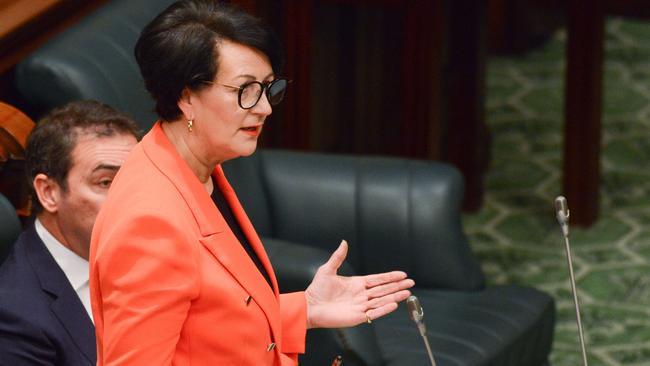Labor says legal advice shows Chapman broke ICAC secrecy rules
LABOR has seized on new legal advice which raises doubts about the legality of a statement by Attorney-General Vickie Chapman on SA’s ICAC, as it questions whether she broke a secrecy clause.
READ BELOW: Analysis — This turns law into a joke
A FORMER Federal Court judge has found permission to talk about possible inquiries of SA’s anti-corruption watchdog must come before any public statement is made, as Labor intensifies its claims Attorney-General Vickie Chapman may have breached secrecy laws.
New legal advice from Victorian QC Raymond Finkelstein, commissioned by the Opposition and released to The Advertiser, concludes SA’s Independent Commissioner Against Corruption cannot give retrospective exemption from strict secrecy laws surrounding the agency.
After a heated showdown in Parliament’s Budget Estimates last month over the unexplained leave of two Renewal SA executives, Ms Chapman released a statement saying she had asked ICAC boss Bruce Lander if he would comment on the matter and was told he would not.
Later, Mr Lander issued a statement allowing the media to publish Ms Chapman’s comments.
It sparked intense speculation over whether Ms Chapman had breached an ICAC secrecy clause which bans discussion of inquiries that are under way or could be launched later.
Mr Finkelstein’s advice, dated October 17, finds “It is clear that the Commissioner cannot retrospectively authorise a disclosure” of information which suggests a person is being investigated.

“The plain language of the provisions indicates that it is limited to the grant of prior authorisation of a disclosure or publication,” he writes.
“Importantly, it is difficult to see what purpose would be served by construing the power to be retrospective.
“If the disclosure has caused harm, either to an individual or to the conduct of an investigation, that harm would not be undone by a retrospective authorisation.”
The maximum penalty for a person who breaches the secrecy law is a $30,000 fine.
Ms Chapman has told Parliament she obtained advice from Crown law over the matter, which clears her of any wrongdoing. However, she has refused to release that advice.
“I have read it. I have taken the advice, and I am satisfied that I am not in breach of any part of the Act,” she said in Question Time last week.
Ms Chapman is expected to face renewed questioning today, as Parliament resumes with her as Acting Premier. Labor has previously written to SA Police seeking an investigation, and is calling for Ms Chapman to stand aside pending a full judicial probe.
Opposition legal affairs spokesman Kyam Maher said Ms Chapman must produce evidence that she had received permission to make her statement prior to it being released.
“If the Attorney-General can’t or won’t do that, her position is untenable and she has to stand aside while the matter is fully investigated,” he said.
“It’s extraordinary that the Attorney-General may have broken the law. The first law officer of the state now needs to be absolutely clear on what authorisations were or weren’t given to her to make her statement.”
Ms Chapman’s office declined to comment further when contacted yesterday.
This entire shemozzle makes a joke of law
ANALYSIS — WHEN the state’s top law officer runs into potential trouble over claims of having breached secrecy clauses within legislation that she oversees, you know there’s a problem.
For Labor, the politics of the situation are intoxicating.
Amid confusion and chaos in Parliament last month, they believe that Attorney-General Vickie Chapman may have made a statement which falls foul of the Independent Commission Against Corruption laws Labor wrote.
The Opposition now has considered and formal legal advice from an eminent former judge, which adds significant credibility to what has until now been a he said-she said argument that splits on party lines.
This opinion will embolden Labor’s attacks as State Parliament resumes tomorrow with Ms Chapman as Acting Premier, and captive in Question Time for three days when the Opposition can scrutinise every word of her responses.
Ultimately though, for this dispute to have any real consequence, it would require someone to take action against Ms Chapman and have the claims tested in a court.
Police haven’t indicated what action, if any, will be taken over Labor’s written request for an inquiry.
Independent Commissioner Against Corruption Bruce Lander has shown little sign of taking the matter much further.
But amid all the political wrangling, a more important public interest question also lacks a clear answer.
If the Attorney-General can be accused of illegality for seeking to provide some clarity about the whereabouts of two highly-paid public sector executives, the very validity of the law itself has to be in question.
Later this year, Parliament will give the ICAC powers to hold open maladministration hearings. It seems impossible now that our MPs can ignore the opportunity to do something about fixing this super-secrecy problem at its root.
